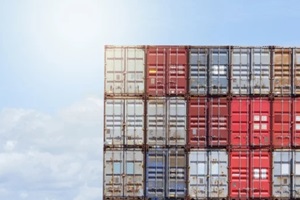 CPG, or consumer packaged goods, keeps the economy functioning and ensures families and businesses have what they need to succeed.
CPG, or consumer packaged goods, keeps the economy functioning and ensures families and businesses have what they need to succeed.
However, CPG companies face numerous risks due to the volume and types of products they create, and comprehensive insurance coverage is essential. Among the types of protections a CPG company should invest in, few are as important as cargo insurance.
Here is an overview of how cargo insurance functions in CPG distribution networks.
How Cargo Insurance Works
Cargo insurance focuses on the protection of goods throughout the transportation process. Any method of product transport may qualify, from on-land trucking to shipments across the ocean.
Cargo insurance excludes all other liabilities, drivers, packaging workers, vehicle insurance, coverage after transport, or while under differing ownership.
In other words, cargo insurance protects the products—not the people or vehicles carrying them. That is why cargo insurance is best utilized as part of a comprehensive suite of insurance protections.
Connecting Cargo & CPG
The importance of product protection in the consumer packaged goods industry is clear. These goods travel from production to holding warehouses, seller warehouses, and finally onto store shelves.
Protecting them in transport allows businesses to consistently meet demand, maximizing profit and limiting losses unrelated to production.
The short life span of CPGs is part of their design that makes them staple everyday purchases, resulting in a high sales rate. Products that sell quickly require constant restocking and more deliveries, creating a high quantity of cargo traveling in and out of CPG warehouses.
Additional Insurance Alongside Cargo Coverage
Cargo insurance is a necessary but narrow type of insurance that leaves gaps in coverage because of its focused protection on cargo products. These spaces are filled by equally beneficial insurance options, such as:
Commercial Trucking Insurance
Commercial trucking insurance is specifically created for the trucking and hauling industry. This is an insurance that covers costs of collisions, damages for other involved vehicles, and company-owned vehicle repairs. Trucking insurance policies can be defined to include situations specific to your truck or trucking company.
Supply Chain Insurance
The stability of the supply chain has an enormous effect on the uncertainty of CPG companies. With supply chain insurance, your premium enables you to mitigate risks by protecting business cargo through the assurance that production of CPG goods will continue without interruption.
Transportation & Loading
Cargo insurance covers the most common modes of transportation: land, sea, and air. CPG shipping and packaging have wide variations that may require additional protection depending on your business.
Household CPG goods are often small and packed in singular advertising packaging. These goods are shipped in bulk crates. Specialty goods must sometimes be packed and shipped differently, with more care for fragile products. Transportation and loading insurance can offer protection for these more niche cases.
What Is Covered
Cargo insurance covers damage to the product that happens in transit. This includes lost or stolen goods as well as when a load of cargo is spilled during its transportation (whether by vehicle malfunction or otherwise). Cargo insurance will also help cover the cost of product loss and debris cleanup.
What Is Not Covered
Exemptions from standard cargo insurance fall into two categories: products excluded from coverage or circumstances where the driver is at fault.
Most insurance agencies exclude easily damaged products, such as paper, money, art, or jewelry, and high-risk products, such as tobacco, alcohol, pharmaceuticals, or live animals. Cargo insurance is exclusive to the product, specifically while in transport, and covers damage that could happen at this stage.
However, this does not cover any damage that is caused by the driver, pilot, captain, or packager. Damage resulting from incorrect packaging is an example of ineligible circumstances.
Cargo Insurance Coverage Options
 Cargo insurance is one of three policies that are most commonly available. All-risk or full coverage includes all physical damage that could happen to the product on its way to its destination and covers all forms of transportation.
Cargo insurance is one of three policies that are most commonly available. All-risk or full coverage includes all physical damage that could happen to the product on its way to its destination and covers all forms of transportation.
Free of particular average (FPA) or partial coverage is curated to specific instances that are written in the policy. These are extremely beneficial to CPG companies that only deal with a few risks due to their transport methods, as well as those that only use road transport or ship through dry areas without risk of water damage.
The third policy option is shipment by shipment, which covers one delivery at a time. This can be a worthwhile choice for infrequent but important shipments.
Get Cargo Insurance From CPG Insurance Professionals
No matter which type of CPG your company produces, ensuring its safety during transportation is paramount. The experts at MFE Insurance work closely with CPG businesses to create an ideal mixture of insurance protection that supports cargo insurance and reduces risk as much as possible. Contact MFE Insurance to discuss your options and purchase the cargo insurance that is right for your CPG efforts.
